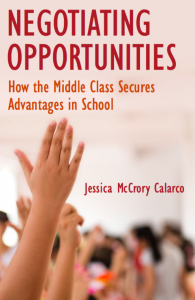 Efforts to level the playing field in education typically start at the bottom. They focus on less-privileged students and on figuring out what those students lack that prevents them from getting ahead.
Efforts to level the playing field in education typically start at the bottom. They focus on less-privileged students and on figuring out what those students lack that prevents them from getting ahead.
That deficit-based, bottom-up approach is problematic because it ignores how privileged families hoard opportunities for themselves. As I have found in my research, privileged parents teach their children to “be their own advocates” in school. Privileged children learn to ask for resources and support in excess of what is fair or required. They also keep asking until well-meaning teachers give in and grant their requests. As a result, privileged students get the bulk of teachers’ support and attention, even when they are the students who need it the least.
Those patterns were particularly apparent one morning at Maplewood Elementary (all names have been changed), where I spent three years observing and interviewing students, parents, and teachers.
Mr. Cherlin was checking homework on his clipboard. Lucy, a working-class, white student, sat low in her seat. Stopping beside her, Mr. Cherlin glanced at Lucy’s empty desk and asked: “Do you have your homework?” Lucy shook her head, not looking Mr. Cherlin in the eye. Mr. Cherlin sighed, explaining matter-of-factly: “You’ll be coming in for recess since you forgot.” Lucy nodded, slumping lower in her chair. Mr. Cherlin continued around the room, stopping next to Sarah, a middle-class, white student whose desk was also empty. Before Mr. Cherlin could say anything, Sarah launched into a breathless explanation, telling Mr. Cherlin: “I couldn’t do my homework ‘cuz I couldn’t find my journal.” Mr. Cherlin chided Sarah, saying she should have written her journal entry on a piece of paper and put it in her journal when she found it. Sarah nodded, then asked hopefully: “So, do I have to stay in for recess?” Mr. Cherlin thought for a moment and then conceded: “Just get it done tonight and show me tomorrow.” Ultimately, Lucy stayed in for recess, and Sarah did not.
Privileged students like Sarah (i.e., those with college-educated, professional parents) asked teachers to check their answers on tests. They asked for extensions on assignments. They asked for exemptions from snack policies and playground rules. They asked teachers not to punish them when they ran in the hallways or forgot their homework at home. Privileged students like Sarah also challenged teachers’ authority. Rather than sit patiently with their hands raised, they called out, got up from their seats, and even interrupted with questions. When teachers tried to deny their requests, privileged students kept asking until teachers said “yes,” instead.
If self-advocacy—or what I call negotiating advantages—helps students succeed, is it really a problem? And couldn’t we just teach less-privileged students to advocate for themselves? I would argue that, yes, negotiated advantages are a problem, and no, teaching less-privileged students to negotiate advantages is not the best way to reduce inequalities in school.
First, negotiated advantages reinforce the notion that rules don’t apply to the privileged. School discipline disproportionately affects poor and minority students. Starting as early as preschool, those students receive harsher and more frequent punishments from teachers. Those punishments undermine the success of less-privileged students and create a “school-to-prison pipeline.” It is easy to assume from those disparities that privileged students are just better behaved. What I found, however, was that privileged and less-privileged students both broke school rules—where they differed was in how they responded when they got caught. Less-privileged students accepted the consequences. Privileged students negotiated their way out of punishment, instead.
Second, negotiated advantages are problematic because they are unfair to teachers and other students. Teachers are already burdened by soaring class sizes, scarce resources, and stacks of material to cover. Allowing students to negotiate advantages wastes time and resources. It also ensures that teachers’ support disproportionately benefits students who demand it—and not necessarily students who need it most.
Third, negotiated advantages are problematic because less-privileged students cannot use them to get ahead. In the classrooms I observed, students’ success in negotiating was directly linked to their (and their parents’) privilege. Teachers relied on privileged parents. Through their donations and volunteer efforts, privileged parents supported arts programs, after-school sports, classroom technology, library renovations, and field trips. Privileged parents also advocated for teachers when politicians threatened to cut benefits or teacher pay. For teachers, saying “no” to privileged students meant jeopardizing that support.
Educators and policymakers have tried to level the playing field, but those efforts often start at the bottom. They aim to help less-privileged students by increasing choice or by teaching less-privileged students to act like their more-privileged peers. Those efforts have merit, but they have failed to reduce growing inequalities in school.
If we truly want to level the playing field, we have to start at the top. That could mean limiting privileged parents’ ability to bolster the budgets of their children’s schools, to use public funds for private tuition, or to influence students’ placement in advanced classes. Essentially, we need clear policies that prevent privileged families from finding new ways to get ahead. Because the playing field can’t truly be level if one side gets to negotiate the rules.
Jessica Calarco, an assistant professor of sociology at Indiana University, is the author of Negotiating Opportunities: How the Middle Class Secures Advantages in School.

Comments 1
Vilson — June 29, 2022
Second, negotiated advantages are problematic because they are unfair to teachers and other students.